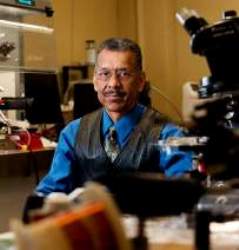Oct 3 2012
NJIT Research Professor Reginald C. Farrow, PhD, who with his research team have discovered how to make nanoscale arrays of the world's smallest probe for investigating the electrical properties of individual living, cells will receive on Oct. 4, 2012 the NJIT Board of Overseers Excellence in Research Prize and Medal. Larger electrical probes have been extremely important in understanding these properties, as indicated by the Nobel Prizes awarded to the inventors of two previous generations of probes.

Farrow's probe uses carbon nanotubes that are a hundred times smaller and offers the advantage of allowing small parts of a cell to be singled out for study with multiple probes. Furthermore, the larger probes restrict cell functions while the new nanoprobe does not. Besides increasing basic knowledge of cell physiology, this probe has practical applications such as determining the healthy dose of drugs, since the distribution of electrical charges in a healthy cell changes markedly when it becomes sick.
Carbon nanotubes are very strong, electrically conductive structures a single nanometer in diameter. That's one-billionth of a meter, or approximately ten hydrogen atoms in a row. Farrow's breakthrough is a controlled method for firmly bonding one of these submicroscopic, crystalline electrical wires to a specific location on a substrate. His method also introduces the option of simultaneously bonding an array of millions of nanotubes and efficiently manufacturing many devices at the same time.
Being able to position single carbon nanotubes that have specific properties opens the door to further significant advances. Other possibilities include an artificial pancreas, three-dimensional electronic circuits and nanoscale fuel cells with unparalleled energy density.
Farrow's cutting edge work with nanotubes has already had a key role in advancing the development of a unique biofuel cell. NJIT Research Professor Zafar Iqbal, Department of Chemistry and Environmental Science, had created a potentially more efficient alternative to conventional batteries that employs a pair of enzymes to convert sugar into electrical energy. Iqbal's design incorporated positive and negative plates, an anode and cathode, in a configuration similar to that found in all fuel cells. Farrow's team used single carbon nanotubes with enzymes attached for the anode and cathode and placed them just two micrometers apart on a single plate. They also fabricated an array on a single plate with multiple nanoscale biofuel cells. Since each is so small, there is negligible internal resistance, which typically causes substantial energy loss. The power density is the highest ever achieved using the enzymes selected.
"Imagine electrical circuits that have billions of highly efficient micron-sized batteries powering individual components," Farrow says. "We've created new engineering that can scale down the AA batteries in a television remote to the nanoscale. But it's engineering we can use to create power sources on a larger scale as well, devices that are much lighter and contain less toxic material than the typical battery." It's engineering that could also lead to minimally invasive physiological monitoring, targeted drug delivery, brain and spinal stimulation, and other medical applications using nanoscale devices powered by the body's own glucose and oxygen.
Farrow has published over 60 papers in peer-reviewed journals and proceedings, received 11 patent awards, four while at NJIT, and given 14 invited talks. The U.S. Defense Advanced Research Projects Agency, the National Institutes of Health, and the U.S. Army's Armament Research, Development and Engineering Center have all supported his research. Farrow was president and conference chair of the 2012 International Symposium on Electron, Ion, and Photon Beams and Nanofabrication.